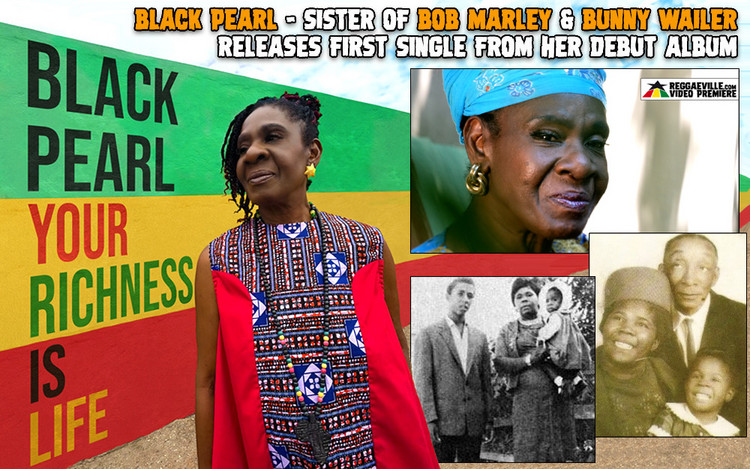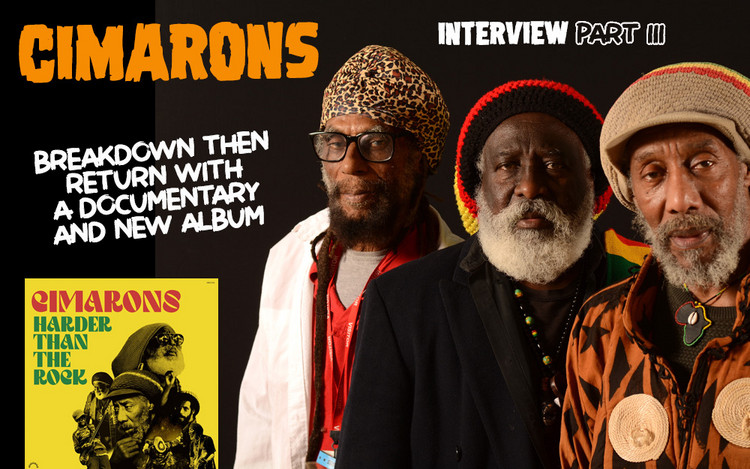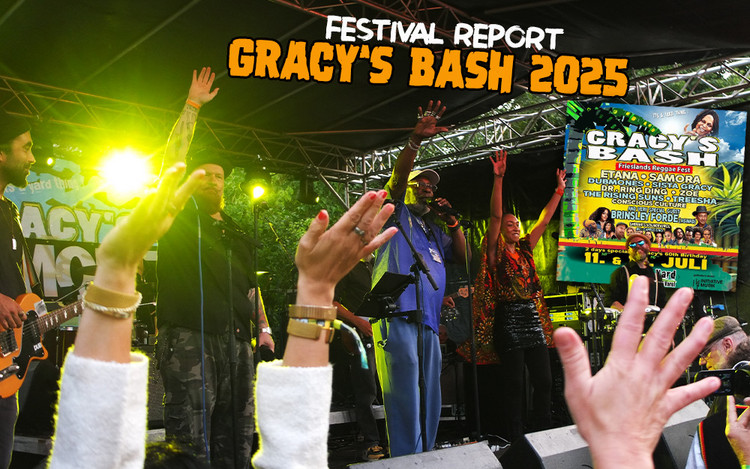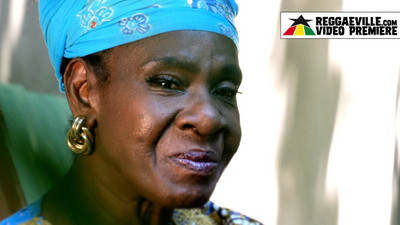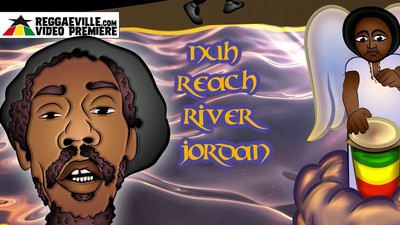
Etana ADD
Review
Album Review: Etana - I Rise
10/28/2014

One of the most anticipated releases of the year is Etana’s fourth album, I RISE. It comes with a strong set of tunes delivered at the highest production values, suited to a Jamaican recording artist of her calibre and creative songwriting ability.
This set finds her in role model mode, but also as a woman in love, a woman in control and yet ready to soar; expanding to higher heights, a woman challenging the creative process and the system as a whole.
Etana crafted these songs with the great producer and legend Clive Hunt whose abilities as a multi-instrumentalist coincide with his determined standards as a perfectionist behind the console. He understands his artist’s needs and vision and continuously works to perfect and streamline the mixes he brings. Etana enlisted Clive Hunt for the recording in order to bring to the recording a sense of her live performance and the sense of being in “the zone” with a full band. Mr. Hunt is a talented horn player and first worked in music as a trumpet player for Byron Lee & The Dragonaires. Having a producer who has been in “the band” means that he understands the nuances the lead vocals play in the performance. Here Etana utilizes here producer’s background as a horn player and as an arranger to season the tunes with live horns that go deep into the roots of reggae at its genesis in the blue-beat & the ska era. Still present is the roots reggae energy of Etana, she maintains the roots like she is keeping the eternal flame, never veering from her mission to present her true creative self.
The roots of reggae are also found in songs of praise, how fitting that Etana would open the album with the Wailers’ first-ever Rastafarian-themed song, “Selassie Is The Chapel”. This song has its roots in Black R&B, as did many songs that were remade during the genesis of reggae, the song was originally written in 1953 by the harmony group The Orioles as Crying In The Chapel and remade by Elvis Presley. Mortimer Planno changed the lyrics to reflect Haile Selassie and the Holy Trinity and a music movement was born. Here Etana’s version shines with her vocal tone so deeply influenced by American vintage R&B and enhanced by gospel harmonies fitting to the original.
To lean into the album theme, Etana asks How Long voicing her concerns for the people and the juxtaposition with the leaders who carry on without concern for the sufferers. Speaking truth to power she chants, “Promises don’t feed hungry belly, set your traps you kill ghetto pickney”. While soaring horn lines, a rocking rhythm section and guitar licks mock Babylon and Etana becomes increasingly indignant.
For On My Way Etana chants a positive motivational line, “High meditation, strict dedication, straight from the roots I grow.” Sung from a first person perspective of a sojourner on the path, this is a great devotional to endurance and remaining on that path. When you listen to this one in headphones the stereo mix takes you down the path too, with crash cymbals, panning trumpets even a pan flute sound lending to the sojourn.
The other cover tune found on this album, Marcia Griffiths’ classic Stepping Out of Babylon is a fabulous tribute to the original, produced by Sonia Pottinger in 1978. Coincidentally Marcia was a singer with Byron Lee and the Dragonaires, getting her start in 1964. One can imagine Mr. Hunt and Marcia as band mates and thus the challenge was present to make the new version soar. The harmonies, an important component of this song are flawless.
Destined for nation building is Jamaica Woman from the artist known as “The Strong One” with its melody rooted in a vintage cadence, it sounds like the answer to the call to step out of Babylon from the previous track. Bubbling keys, blazing horns, true harmonies float under her pledge, “We living in a god blessed country, where the woman dem a natural dem a natural beauty, so we black and we proud, we no let the system come trap we, if you leggo negative vibration, strictly love in a this iration.” One of the best ways to counteract the negative propaganda of the “angry black woman” stereotype is to sing a nationalistic song about the ancient strength of the feminine.
The title track I Rise rides a one-drop over the painful process, “I’m hurt but I’m not broken, down but I won’t die.” One of the strongest voices in reggae, Etana’s soaring range encourages and rolls up and down the scale and rhythm. Moving into more messages of hope and sustained, triumphant notes Richest Girl counteracts the bling culture so prevalent in music and encourages the love of a partnership with its focus on the true gifts of life and true love. Etana sings lyrics that remind that of the temporary nature of the world, how things can change in an instance, “Everything that matters is always free. I could own it all, money in the bank, the world forgets my name, one thing that is true, if I wake up next to you, I’m the richest girl.” For Love Song she carries on with this theme “I will love you when the pot is empty, I will love you when you are not so strong.” Making a pledge to “ride or die” she shows the devotional side of a woman, how a woman can stay by her man despite the slip ups and be a friend.
Continuing with the theme of loyalty, By Your Side channels vintage R&B with harmonies, organ, horns and tambourines between lovey dovey words of how deeply a woman feels. A wonderful vamp carries the tune out, destined to rock the stage, this one gives a view as to what Etana’s live show feels like with its gospel vibe.
Passing Thru which calls out the baby fathers who pass by the responsibilities of their domestic situations, not contributing to the family unit other than as a “sperm donor” or to give some money here and there while deceiving the woman holding down the home front. As Etana cautions, “Passing through don’t make the connection true, she might realize she made herself blind, the truth will come out in time.” A melancholy mood that stings with live horns, crashing cymbals, haunting piano that magnify the dual realities and revelations of the man who passed through now “with another woman and even another baby….”
The story of Trigger is bittersweet, a child tells his mother how sorry he is to have to “pull the trigger again” even though he said he wouldn’t do it again. Over a happy one-drop he declares, “I know I tried but the world’s not on our side.” It’s unfortunate that violence of this type is the norm in Jamaican culture, part of the fabric of the society, guns and their use are part of how people survive. Expenses like “chemotherapy, phone card, bag juice money” are illustrated as those the son feels pressured, asking “if not me who will save you?”
For Ward 21 (Stenna’s Song) Etana outlines the tale of Stenna, now in the mental health ward, known as “Ward 21” in Kingston’s University Hospital of the West Indies. This tune outlines the story of a youth facing pressure who “couldn’t take it at all”. “Some swear say a obeah or its stress” explaining that when the police come and retaliate against the people, the result can be devastating. The song has a lengthy dub portion forwarding the the “locked down in a crazy ward” vibe.
Emancipation is a call for liberation of the mind and unity to achieve “true liberty” calling on Marcus Garvey and other thought leaders. The groove shifts from a driving rock tempo to a slower tempo with African style percussion. Etana takes the opportunity to give a spoken word teaching explaining the roots of her call for emancipation, “Africans are in bondage today because they approach spirituality through religion provided by foreign invaders and conquerors we must stop confusing religion with spirituality. Religion is a set of rules and regulations and rituals created by humans which is supposed to help people grow spiritually. Due to human imperfection, religion has become corrupt, political, divisive and a tool for power struggle. Spirituality is not theology or ideology, it is simply a way of life, pure and original and was always given by the Most High of creation to emancipate.”
Taking strength from the Rastafarian spiritual teachings, Etana reminds us to “give thanks and praise for what our god has done” on Jah Jah a devotional to Haile Selassie I. Sailing smoothly over a groove that features a sweet guitar lick, Etana’s comfort and strength is found in the song. To close out the set, Etana creates a special “big up” tune in the form of Jam Credits. She shouts out all of the players and her producer Clive Hunt as well as the executives from VP Records, and her manager and partner in life, Andre Morris. A classy gesture, as she told Reggaeville, Etana did it because the majority of people who buy the album will not see the liner notes as they do not appear in the digital download files. This was devised as an audio thank-you to those involved.
As one of her biggest hits Roots says, “You can’t water down and dilute”, this album comes from a place of truth, and the artist’s willingness to express her own personal convictions, whether in love or in tragedy, in spirituality or in deceit, Etana’s standards for authenticity are very high and rising.
Release details

Etana - I Rise
DIGITAL RELEASE / CD [VP Records]
Release date: 10/28/2014
Tracks
01. Selassie is the Chapel
02. How Long
03. On My Way
04. Stepping Out Of Babylon
05. Jamaica Woman
06. I Rise
07. Richest Girl
08. Love Song
09. By Your Side
10. Passing Thru
11. Trigger
12. Ward 21** (Stenna’s Song)
13. Emancipation
14. Jam Credits




